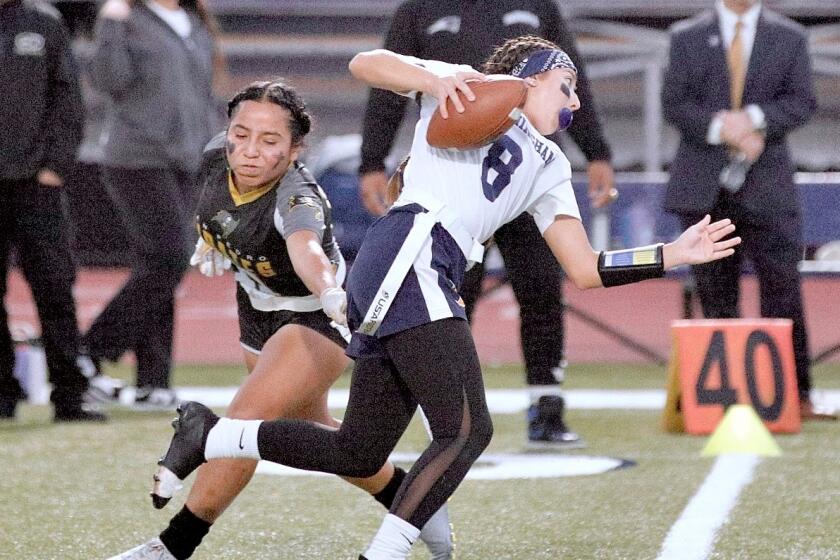Tiger Woods admits infidelity, announces break from golf
Tiger Woods, admitting for the first time that he had been unfaithful to his wife, announced “an indefinite break from professional golf” on Friday, sending ripples of alarm through television networks, corporate sponsors, PGA executives and the rest of a multi-million-dollar industry that has been built around one of the world’s most bankable athletes.
Woods said the decision came “after much soul searching,” and a realization that “it may not be possible to repair the damage I’ve done, but I want to do my best to try.” The statement on his website didn’t say how long he intended to remain away from the sport, but added: “I need to focus my attention on being a better husband, father and person.”
The decision will have the most immediate impact on the PGA Tour, which already has been losing sponsorships and is in desperate need of his drawing power as it prepares to begin a new season next month.
“By himself, Tiger is probably 50% of golf,” said John Feinstein, a sports commentator and author who writes frequently about the sport. “Will the PGA Tour fold up and go away? No. But they have some serious issues. There is a little bit of panic.”
Woods, 33, has been that most valuable of sports figures, an athlete who has drawn millions of casual fans to the sport and is recognized as a symbol of excellence even among non-golf fans. He became the first athlete to post career earnings of more than $1 billion earlier this year, with most of that money coming from endorsements that include a $30 million annual deal with Nike as the front man for its line of golf clothes and equipment.
“He was the transcendent figure every sport wants -- and he can no longer lay claim to that,” said John Rash, senior vice president of the Minneapolis advertising firm, Campbell Mithun. “It’s unlikely he’ll ever be perceived in quite the same manner again. No one should ever count Tiger out in terms of his golfing ability. But his exceptionalism has been forever altered.”
Woods’ announcement, and his declaration that “I am profoundly sorry and ... I ask forgiveness,” was an attempt to quell two furious weeks of unwelcome attention that began when he crashed his Cadillac Escalade at his home near Orlando. The authorities reported the odd detail that his wife, Elin Nordegren Woods, had broken the vehicle’s back window with a golf club to extricate him.
The accident quickly led to questions that Woods and his attorney declined to answer -- and then to revelations about Woods’ extramarital activities. One woman had a voicemail she said was left by Woods two days before the accident. Since then, several women have added claims that they had affairs with Woods during his five-year marriage to Elin, 29, with whom he has two young children.
In his statement, Woods said he was “deeply aware of the disappointment and hurt that my infidelity has caused to so many people, most of all my wife and children.”
On NBC’s “Today” program Friday, one of the women, Jamie Jungers, from Las Vegas, said she met Woods at a nightclub in 2005 and began an 18-month affair with him. She said she had harbored a crush on Woods for years, and “was very excited and honored” that he was interested in her and was heartbroken when it ended.
Some nervous companies with endorsement deals with Woods have held off on running ads featuring him. On Friday, Bloomberg.com reported that Accenture, a consulting company that had built its marketing campaign around him since 2003, had taken his image off the home page on its website.
Woods, with an estimated net worth of $600 million, has $110 million in endorsement deals, according to Forbes. In addition to Accenture, Nike and Gatorade, they include Tag Heuer watches, Electronic Arts Inc., Gillette, NetJets and TLC Vision Corp. Up to now, most of the companies have said they have no plans to alter their endorsement deals.
Woods’ break from the PGA Tour is likely to have a devastating effect on TV ratings for golf, which is a staple of sports programming for the big broadcast networks.
“Not having Tiger on the tour will be a huge loss because that’s who everyone wants to see,” said Jeff Barber, manager of the Griffith Park Golf Course in Los Angeles.
When Woods suffered a season-ending knee injury in mid-2008 and took an eight-month break for surgery, many events on the PGA Tour saw catastrophic ratings declines.
A study comparing eight tournaments Woods played in 2007 with the same tournaments he missed in 2008 found ratings down 47% overall, according to the Nielsen Co. During his professional career, TV ratings of Masters tournaments that Woods has won have drawn 20% more viewers than those he hasn’t.
Double-digit declines were recorded in several tournaments during Woods’ off year, but the sharpest decline was posted in the PGA Championship in 2007 and 2008. On the final day in 2007, when Woods won by two strokes, more than 9 million viewers were watching. The next year, when Padraig Harrington won and Woods didn’t play, viewership dropped 57.6%.
Nielsen noted in a report that the “Tiger effect” continued to the Web, where Woods’ astonishing victory at the June 2008 U.S. Open led to record traffic for the PGA Tour website.
Some golf analysts, however, questioned how long Woods was likely to remain away from the game. In past years, he has played sparingly before the Masters in April, and, in any case, he had not yet committed to play in any tournaments in January or February.
Neal Pilson, a former president of CBS Sports who now runs his own media consulting firm, said Woods’ decision to take a break made sense for him personally. “Tiger probably does need some separation from golf to gather up his emotions and work out these other issues,” Pilson said. “What it means for television? Golf ratings won’t be as good. Period.”
For days, sports marketers have been debating the effect of Woods’ woes on his reputation as an athlete. Robert Tuchman, executive vice president of Premier Global Sports, says it’s nice to see that Woods “is getting out in front of the story. This is what he needs to do.” And he predicted that Woods would be back for the Masters.
But, Tuchman added, the Woods brand may have suffered permanent damage. “He should be able to play golf for a long, long time,” he said. “But will this be something that people forget? Possibly, but I don’t think so. He was branded as the perfect individual, the perfect golfer, the perfect competitor, the kind of guy with no chinks in his armor.” Now, he added, “he’s going to lose fans forever.”
Woods has won 82 times worldwide, and captured 14 of the so-called major tournaments -- the Masters, U.S. Open, British Open and PGA Championship -- four shy of the record 18 won by Jack Nicklaus.
He has spent a large part of his life in the public eye. A Cypress native, he was taught the game by his late father, Earl, a former Green Beret who gave him the nickname “Tiger” in honor of Earl’s South Vietnamese partner in combat in Vietnam. Woods was swinging a golf club when he was 9 months old and, by the time he was 3, he was hitting golf balls on “The Mike Douglas Show.”
After a celebrated amateur career while at Stanford, he turned professional in mid-1996.
The next year at the Masters, Woods previewed what would become his legendary career by winning his first major tournament by a whopping 12 shots -- at age 21.
Times staff writers Robin Abcarian, Scott Collins and Jim Peltz contributed to this article.
More to Read
Go beyond the scoreboard
Get the latest on L.A.'s teams in the daily Sports Report newsletter.
You may occasionally receive promotional content from the Los Angeles Times.











